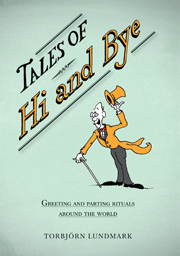Book contents
- Frontmatter
- Contents
- Acknowledgements
- To the reader
- Introduction
- Gestures & Signals
- Take a bow: bending at the neck or waist
- Hi, Hitler! arm salutes at various angles
- Do a nose job: rubbing and sniffing as a greeting
- XXXX! the heartfelt kiss
- Flashy hello: the eyebrow flash
- Getting the shakes: the story of the handshake
- Slaps, daps, thumps and bumps: not so gripping handshakes
- I dips me lid: the hat as a courtesy tool
- Hello? Hell, no! greeting refusals
- Waves of emotion: greeting from a distance
- Customs & Behaviours
- Names & Addresses
- Postscript
- Notes
- Sources
- Index
Hello? Hell, no! greeting refusals
from Gestures & Signals
Published online by Cambridge University Press: 04 February 2010
- Frontmatter
- Contents
- Acknowledgements
- To the reader
- Introduction
- Gestures & Signals
- Take a bow: bending at the neck or waist
- Hi, Hitler! arm salutes at various angles
- Do a nose job: rubbing and sniffing as a greeting
- XXXX! the heartfelt kiss
- Flashy hello: the eyebrow flash
- Getting the shakes: the story of the handshake
- Slaps, daps, thumps and bumps: not so gripping handshakes
- I dips me lid: the hat as a courtesy tool
- Hello? Hell, no! greeting refusals
- Waves of emotion: greeting from a distance
- Customs & Behaviours
- Names & Addresses
- Postscript
- Notes
- Sources
- Index
Summary
Blatantly refusing to say hello to someone is serious business. The act of not accepting a proffered hand, for instance, is an extremely powerful show of contempt or disdain.
There are many instances in film, television and theatre when an outstretched arm is met with inaction – a tense moment indeed, leaving no doubt about what the greetee thinks of the greeter.
Similarly, to hang up the phone without a word after hearing who is calling is almost always portrayed as a great affront in any form of dramatic productions.
In the comedy Black Books, ‘blanking’ (as the refusal to acknowledge someone else is called) is described as something intensely invidious:
[blanking], that's like an awesomely powerful thing to do in civilised society! It's like, it's like, it's like when the mafia send each other fish through the post!
Many are the instances on the political arena where representatives of one side have refused to shake hands with someone from the other.
But it is not all about handshakes. During the opening ceremony of the 1908 Olympic Games in London, a bitter feud between the United Kingdom and the USA caused the American flag-bearer Ralph Waldo Rose to refuse to lower or ‘dip’ the Stars and Stripes before King Edward VII – a most controversial non-greeting. The Irish-born US discus thrower Martin Sheridan was reported to give his famous justification that ‘this flag dips to no earthly king’. And indeed, this caused a precedent: it became custom that the American Olympic team does not dip the flag at these events.
- Type
- Chapter
- Information
- Tales of Hi and ByeGreeting and Parting Rituals Around the World, pp. 83 - 85Publisher: Cambridge University PressPrint publication year: 2009



